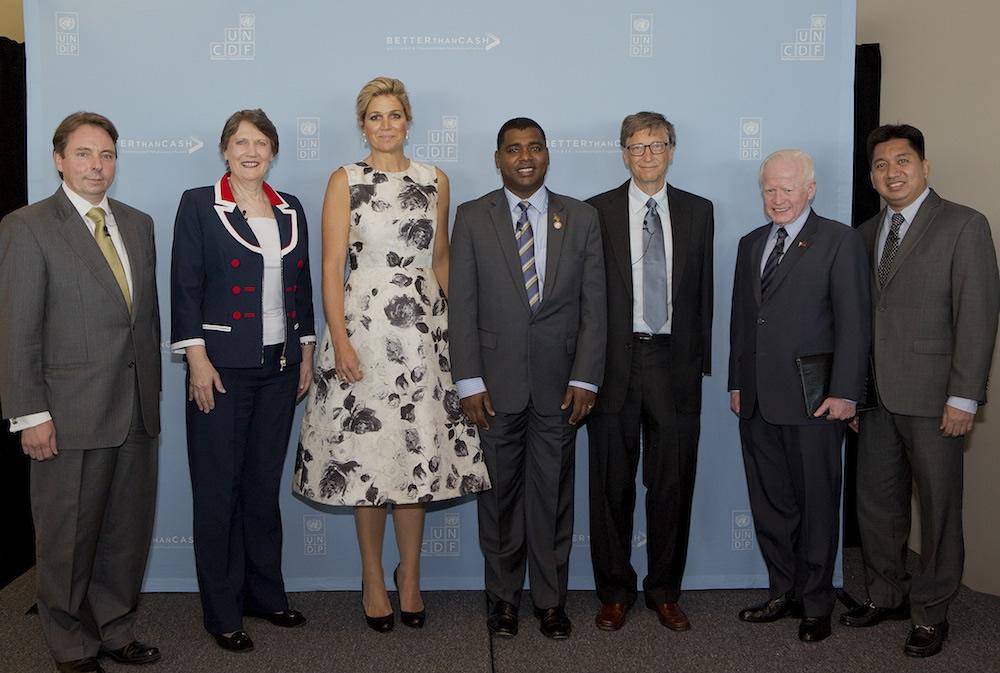Better than Cash Alliance
Partnerships for Digital Financial Inclusion: A Driver for Inclusive Growth event

The UNSGSA stands with leaders from the Better Than Cash Alliance - Photo credit: Arnold Brower
Excellencies, Mrs. Clark, Minister Jooma, Mr. Gates, Ladies and Gentlemen.
I am happy to be with you again, one year after the launch of the Better than Cash Alliance. As leaders gather in New York for the General Assembly, an important topic is how to accomplish the MDGs and to define the development agenda that will follow 2015. Better than Cash delivers a timely message that digital technology is not only making financial inclusion possible but that also it brings the potential to accelerate equitable economic growth, job creation, poverty alleviation, women’s empowerment and much more.
Let me thus take a moment to congratulate the members of the Alliance for your commitment, and to encourage you to keep up the good work. A year ago, I recognized the importance of leadership. Malawi, the Philippines, and the other countries and agencies of this Alliance are leading in the most important way—by example and from the ground up. And Mr. Gates, your vision on digital technology and your generosity are truly changing this landscape.
The very nature of this Alliance illustrates a key point. Only by working together can we harness the transformative potential of electronic payments. In Colombia and Mexico, moving social welfare transfers from cash to electronic payments and bank accounts has increased efficiency, accountability and transparency. It has lowered costs dramatically.
With the support of UNDP and others, elderly and disabled in Fiji now receive monthly benefits directly into their savings account. This greatly reduces the hardships of traveling to pick up cash – not to mention the significant cost savings to government. The global reach of the UN, USAID, the Bill & Melinda Gates Foundation, and other institutional members of the Alliance are so important in spreading national experiences and best practices like this. It is also very good that the Alliance is looking at issues of supply, including topics like regulation, supervision, data, privacy protection, and financial capability.
But let us not forget to look at the client needs and what they demand. Meeting the needs of poor households and small enterprises is where we find the real potential for impact. We need to work hard to make digital payments a gateway to other financial services that can help people get away from the huge costs and risks of holding cash. Savings and insurance are especially important. They facilitate resilience as well as investment in productive activities. For example, farmers in Kenya can insure a small bag of seeds against excessive rain or drought at the moment they buy it. The payment is done via mobile phone. If there is a drought or a flood, the insurance company automatically delivers payout again on the client’s phone. You might think, what does this actually change? This little assistance makes it more attractive for farmers to buy higher quality seed, and thus expand production and increase investment in productive activities.
Moving from cash to electronic payments and then to a diversity of financial services can be challenging. Certainly, it does involve many sectors and stakeholders. So, this will require coordination and partnership around a common goal. And for me, coordination backed by strong political will is key to success.
Tomorrow, the United Nations Secretary-General will present his report on the MDGs and post-2015 development agenda at a special event. This report and an earlier report from the High Level Panel make clear references to the role of inclusive finance to achieve development. I have been very active in this discussion because the post-2015 agenda will shape political priorities, investments, and many actions in the years to come. Let us be sure that this agenda contains inclusive finance. And let’s make it a bold and inspiring vision. Our overall aspiration should be nothing less than universal access to financial services by 2030. Every person, very business in every country deserves this opportunity.
So, in your country level work, please be ambitious. Establish bold targets on e-payments. Then, set equally bold targets for other financial services that can be built upon these e-payments. And, please do not forget the value of sharing your commitments, experience and, very important, evidence of how greater access to financial services has helped reduce poverty and improved health, education and food security, among many other goals.
I wish you much success today and in the partnership of this Alliance, and hope that many other partners join you.